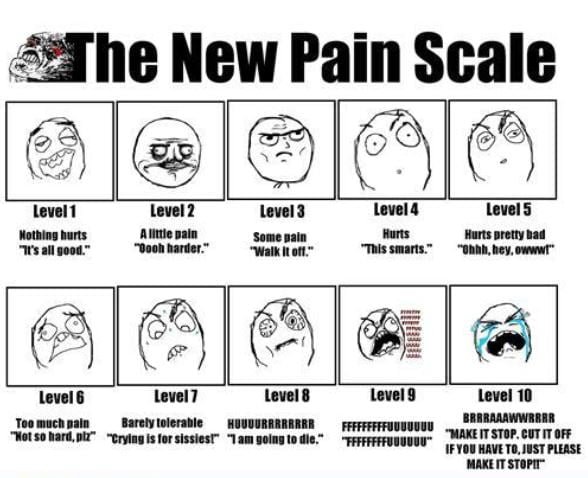
Thanks to rampant opioid abuse, chronic pain sufferers face increased scrutiny and hassle when their doctors prescribe them narcotic medications for their pain. Five years ago, my doctor would write me a prescription for Vicodin with two refills. My Tramadol prescription had five refills. Today? I am treated like a drug addict, not because my doctor wants to treat me this way, but because state and federal law requires him to do so. Here’s what’s required today for me to get my pain meds:
- I must see the doctor every two to three months at a cost of $175 per visit.
- The script cannot be electronically submitted. The doctor must give me the scripts to take to the pharmacy.
- The script cannot have any refills. This necessitates the doctor writing and giving me two or three scripts at a time.
- The script must list what I am be prescribed the medications for.
- The doctor must write the fill date on the script.
- The doctor is required to fill out an opioid load report on me.
- I am required to sign an annual pain management agreement that says my doctor can drug test me at any time without warning.
After I receive the script:
- I have fourteen days to fill the prescription, from the fill date written on the script by the doctor.
- In the case of refills, I can only fill the prescriptions twenty-four hours before they are due to be refilled.
Zeus help you if you lose a script or try to fill your prescription a day too early. You are immediately treated like a criminal. Today, Polly went to the Meijer pharmacy to have my prescriptions filled. The pharmacist and one of the techs had a discussion about whether I was trying to refill my Vicodin prescription too soon. The pharmacy tech had to explain to the pharmacists how to count to one. Worse yet, I didn’t know that the fourteen-day rule applied to Tramadol. It does, and because my doctor listed January 28, 2018 as the fill date, the pharmacist said the script was invalid and he refused to fill it (nor did he make any attempt to call the doctor to get the date straightened out).
I get it, people are dying from opioid addiction (primarily from Fentanyl use), but law-abiding chronic pain sufferers are facing increased indignities as government and law enforcement take a one-size-fits-all approach to illegal narcotic use.
A report posted today by KETV-7 aptly describes what many chronic pain sufferers are going through to get their pain medications. Reporter Rob McCartney writes:
But some say that war creates collateral damage, innocent victims who rely on those opioids to keep their chronic pain at bay.
Joni Pilmaier is one of those patients.
Her entire spine is covered with titanium rods and screws.
She had major surgery ten years ago, for scoliosis and osteoarthritis.
“I was hoping after I wouldn’t have any pain, but that big of surgery it’s not that surprising I guess,” said Pilmaier.
But a decade later she is still dealing with chronic pain.
The former occupational therapist tried physical therapy, spinal injections and bio-feedback.
The best relief though came from opioid treatment.
That medication helps Pilmaier just get out of bed and function at a minimal level.
When asked what she would do if she was forced to give up the drugs, Pilmaier said, “I don’t know. I’m not sure what would happen.”
But a lot of chronic pain patients have to face that very decision right now.
In trying to stem a flow of opioid overdoses, in 2016 the Centers for Disease Control released these Opioid Guidelines for doctors..
The CDC recommends a daily limit of 90-morphine milligrams (MME).
That would be a severe cutback for many patients.
Omaha doctor Kurt Gold prefers using a non-opioid methods [sic] like exercise to treat his pain patients. But he tells me about half of them can’t be helped that way because of painful, permanent nerve damage.
“In those cases I think opiates would be appropriate for them to continue so that they can function,” said Gold.
….
“In Nebraska, the suicides are going up. And as of 2016 we surpassed the national average for suicides per capita. That’s a problem,” said Gold.
The problem is caused by chronic pain patients who see their long-time access to medications reduced or even eliminated.
They think there’s no way out, preferring to end their pain forever.
“In my current practice I’m aware of seven patients that are suicidal. Seven people are on the brink,” worries Gold.
The State of Nebraska said it doesn’t track of why people commit suicide, but The Kim Foundation, an Omaha-based mental health and suicide support group, told me they do hear of that happening.
Pilmaier stresses she is not going to go to that extreme.
But she does see the desperation across the country, as she monitors several chronic pain chat rooms.
“Everybody’s extremely ticked-off at what’s going on,” Pilmaier said, “Some are saying, “Oh my God, what if it happens to me?””
Many pain patients, like Pilmaier, agree the government should go after people who are “gaming the system”. People who illegally obtain prescription painkillers.
But she says politicians should not tell doctors how to do their jobs, nor should they discount what many people will live with the rest of their lives.
“You need to walk a day in my shoes. You don’t know what it feels like to have pain every day, to wake up in pain, to go to sleep in pain. And to be in a climate where the only thing that helps your pain is being taken away from you…,” Pilmaier said shaking her head.
….
Jerry Mitchell, a reporter for the Clarion Ledger, writes:
Many chronic pain patients, who don’t suffer from cancer or other fatal diseases, worry they will become the casualties in the battle against the opioid epidemic.
“It’s like a war on chronic pain patients,” said Jaqueline Schneider, a 56-year-old Pittsburgh woman who suffers from two rare spine diseases. “Nobody mentions legitimate pain patients. It’s like we have the plague.”
She calls what is happening now “opioid hysteria,” saying the federal government’s “overzealous tactics … are creating fear in the chronic pain community.”
Many doctors and pharmacists fear they may become targets and are limiting the opioids they prescribe or distribute, she said. “It’s all trickling down.”
She is hardly alone in those fears.
Dennis Ewing Sr., a 61-year-old disabled printer in San Antonio, takes the equivalent of 135 mg of morphine a day for his intense spinal pain.
The U.S. Centers for Disease Control and Prevention has recommended health care providers prescribe no more than a 90 mg morphine equivalent and justify it whenever they go beyond that amount.
If reduced to that limit, “I wouldn’t be functional at all,” Ewing said, adding that he fears he might commit suicide in that case. “It scares the hell out of me.”
He has already changed pain doctors because the previous one took away his longtime prescription for muscle relaxers, which are the only way he can sleep, he said.
He knows he is physically dependent on opioids and would encounter withdrawal if he went off the drug, “but I’m not an addict,” he said. “I’ve been fighting this pain since the 1990s.”
I have lived in persistent chronic pain for 17 years. My body chemistry has physically changed to believe that pain is normal. I’ve gone through every test and every diagnostic procedure imaginable, and pursued every treatment available to me. I’ve repeated treatment options countless times hoping many of them will one day bring relief. I have adjusted my lifestyle countless times, changed my diet countless times, incorporated methods of healing from other cultures, pulled from all resources in Eastern and Western medicine and beyond.
I remain in constant pain, despite all my efforts. This abnormality is my normal, 24 hours a day, 365 days a year.
There are millions of people in this country alone who struggle with chronic pain every day, just like me. Chronic pain conditions are notoriously misunderstood and misdiagnosed.
For 17 years, I have taken painkillers to help manage my pain. I don’t take them every day. I don’t rely on them as a solution to a never-ending problem or view them as a cure. I take painkillers when I literally think about throwing myself into a wall because being unconscious is preferable to being in that much pain.
Yes, it is that extreme, because taking painkillers has never been a casual decision, for me or for my doctors (past and present) that prescribe them to me. Doctors shouldn’t prescribe painkillers unless they are absolutely, medically necessary and patients shouldn’t be reckless about taking them.
The uncomfortable truth that no one wants to talk about is some patients need painkillers to survive. Yes, need. This is not debatable. This is not politics. But myself and patients like me are severely punished in this war on opioid addiction. We are the people whose quality of life will be greatly affected, even though we have done nothing wrong and have taken our medication as directed. We are the people who are constantly shamed, every day, for this reality we live in and cannot change. And we are the last people who should apologize for needing this legitimate medical treatment.
….
Many people living with chronic pain conditions already live with constant guilt about their circumstances. The shame and stigma I have encountered living with a chronic pain has driven me to hide it from the world. It is only recently I have begun to speak openly about the side of my life I never let anyone see. Early on, my honesty was met with hostility and rejection. People don’t understand what they cannot see.
I chose to live a life that includes more than being a professional patient with four doctor appointments a month. But this choice comes with the price of being misunderstood even more. The daily physical and emotional struggles I have are enough. I don’t need government officials completely destroying the quality of life I have come to know with medication.
In an effort to save the lives of people who abuse prescription drugs or become addicted to illegal drugs, this “war on opioids” is setting up a medical system that will only bring misery to patients who are not addicted to drugs and in genuine need of painkillers. My rights and my fellow chronic pain patients’ rights are on the line. When you live in constant physical pain and you find something that provides you with any kind of relief, it cannot and should not be taken away.
Chronic pain sufferers are low-hanging fruit; easy targets for the DEA and state law enforcement as they wage war against drug addiction. Quite frankly, I am tired of being a target. But what other choices do I have? Without pain medications I would be dead, murdered by my own hands. The drugs I take provide me a respite from pain. Narcotics don’t make the pain go away, but they do lessen the pain and smooth out (on most days) spikes in pain levels. Is it too much to ask that, in the midst of my suffering, I not be harassed and shamed by medical professionals, pharmacists, and government officials?
Bruce Gerencser, 66, lives in rural Northwest Ohio with his wife of 45 years. He and his wife have six grown children and thirteen grandchildren. Bruce pastored Evangelical churches for twenty-five years in Ohio, Texas, and Michigan. Bruce left the ministry in 2005, and in 2008 he left Christianity. Bruce is now a humanist and an atheist.
Connect with me on social media:
Your comments are welcome and appreciated. All first-time comments are moderated. Please read the commenting rules before commenting.
You can email Bruce via the Contact Form.

